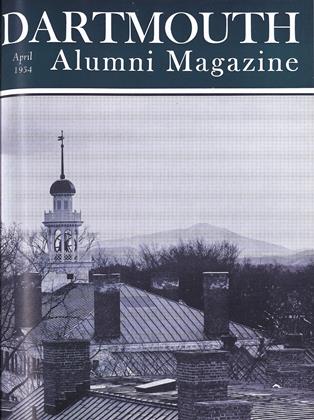For his classmates in Hanover's sixth grade the first snow of 1942 merely restored matters as they should be. But to Lo-Yi Chan '54 the snow was amazing. Why didn't it come down in large balls as he had always imagined? He threw himself on the ground and rolled in the snow. His recollection of the event now, through the mind of a man who has been accepted for the Harvard Graduate School of Design, is that he "got awfully wet."
Lo-Yi (friends call him Louis) was born in Canton, China in 1932; his father, now Professor of Chinese Culture and Philosophy at Dartmouth, was Dean of Lingnan University. Professor Chan taught in Hawaii in 1936 and after six years the family moved to Hanover.
It didn't take Louis long to prove to his friends that he could do more than roll in the snow. He sailed through grammar school and into high school with an outstanding record. He was active on the school paper and his teachers took notice of his brilliance in the sciences. Work in his freshman year at Dartmouth fell off, however; the difficulty of college work took its toll: he got two B's.
Louis thought for a while about medicine and then, because of the room for creative thought, decided upon architecture. He has taken a modified Art major for pre-professional training in architecture. This included work in mathematics, physics and chemistry, courses in general engineering at Thayer School and design and architectural courses in the College as well as work in economics and city planning.
But even Louis couldn't make Phi Beta Kappa with such courses without quite a bit of hurrying around and in the last few years he has put over 5,000 miles on his bicycle. He has done some excellent photographic work and "so far is a very lucky skier" with no fractures or serious crack-ups on the record. This spring vacation he will cap off four years with the Glee Club on its 22-day tour. The Club will bring Dartmouth to such far away cities as Birmingham, Memphis and Oklahoma . City. Louis sings bass and solos "only by accident."
He is sure that the Hanover Inn lost money the summer he worked on the dessert counter. He has also worked summers as a camp counselor and as a construction worker on the Hungry Horse Dam project in Montana, learning the basics of his profession by stripping forms from the concrete and laboring under the hot sun as an apprentice roofer. He got a little closer to a drawing board last summer working in a San Francisco architect's office.
Louis' designs are contemporary, although he doesn't argue with some of his fellow students who "like the old log cabin." ("It's what they have seen and are used to.") Ted Hunter '38, Hanover's outstanding residential architect, is an Assistant Professor in the Art Department and Louis has had several courses with him. The model shown with Louis on this page is a project undertaken under Professor Hunter's direction. The class was given the needs of a client and then set free to design a home for him. There was a choice of making drawings of the exteriors or constructing a model; Louis chose the model which is now on exhibit in Carpenter art gallery. He is keenly interested in a new course in basic design that is being given in Fairbanks Hall, the old Clark School building behind Baker Library. In this course the students are encouraged to let their imaginations fly free as a stimulus to creative effort that someday will be a measure of their success.
Louis hopes to practice in the Pacific Northwest and, if conditions permit, travel to China and spend a year or so brushing up on his Chinese. He understands Cantonese, but makes his father wince when he tries to speak his Anglicised version. Also, if possible, he would like to master the Mandarin dialect which is spoken in many parts of the United States.
Louis has a long way yet to go in architecture; he knows that. But he has a lot of people rooting for him. As one of his teachers said in a letter to the Harvard Graduate School: "This is the kind of man we academic people exist for: rare talents come seldom; one wishes so much that they will be brought to fruition, and in some measure justify our work, and our hopes."
LO-YI CHAN '54
 View Full Issue
View Full Issue
More From This Issue
-
 Feature
FeatureAn Introvert at Dartmouth
April 1954 -
 Feature
FeatureADMISSIONS—SCHOLARSHIPS—ENROLLMENT
April 1954 By Robert L. Allen '45 -
 Article
ArticleThaddeus Stevens, 1814
April 1954 By JOHN S. MONAGAN '33 -
 Class Notes
Class Notes1918
April 1954 By ERNEST H. EARLEY, RICHARD A. HOLTON -
 Class Notes
Class Notes1921
April 1954 By REGINALD B. MINER, WILLIAM H. PERRY -
 Class Notes
Class Notes1915
April 1954 By PHILIP K. MURDOCK, MARVIN L. FREDERICK













